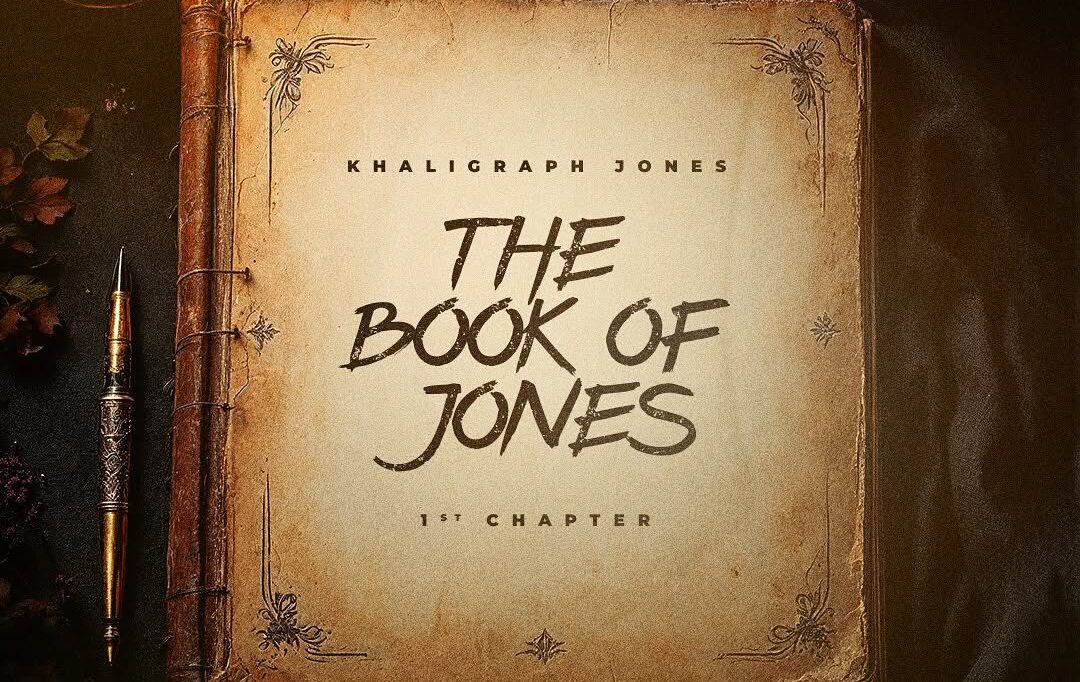The Book Of Jones 1st Chapter feels like a continuation of a well-worn path, rich in the flair that makes Khaligraph Jones stand out, but a risky bet in a landscape where tastes are shifting faster than he seems willing to.
By Frank Njugi
Over its 50+ year journey, Hip-Hop has evolved from a cultural movement born in the African American communities of the Bronx to a global phenomenon, with its appeal striking a chord with audiences worldwide. This includes East Africa, where local artistes have for decades now blended the genre with regional influences, forging a powerful cross-cultural bond.
In the past two decades, no other East African rap artiste has established a more notable name for their prowess in the creation of Hip-Hop music than Brian Ouko Omollo, known by his stage name Khaligraph Jones, who has continued to dominate the scene with unmatched talent and influence.
Khaligraph Jones is known for his full-length studio albums Testimony 1990 (2018) and Invisible Currency (2022). Jones has also received numerous accolades in his long career such as being nominated for Best Male Artiste at the 2018 AFRIMMAs, winning the Best Hip-Hop Artiste at the 2020 AFRIMMAs, and was also nominated for Best International Act at the 2020 BET Awards.
His most recently released project is an album whose title suggests an inaugural chapter in what promises to be a new series of projects. Named The Book Of Jones 1st Chapter, the project reveals Khaligraph Jones’ ambition to conceptualise something fresh and new for his fanbase.
At its core, the new album, The Book Of Jones 1st Chapter, underscores a savvy industry move: leveraging collaborations with Kenyan artistes such as Teya Ticasso, Timmy Blanco, Silverstone Barz, Nyashinski, Mordecai Dex, and Nigerian rapper Falz, together with the fifth installment of his acclaimed Khali Cartel cypher series.

These appear not just as artistic choices, but as strategic tools to sustain his cultural capital, reaffirm his presence in an increasingly collaborative market, and reinforce his brand within Hip-Hop’s shifting power dynamics.
“Khali cartel 5” is the latest iteration of Khaligraph Jones’ Khali Cartel cyphers which is the acclaimed cypher series that has cemented itself as a cornerstone of Khaligraph’s brand—an avenue not only for spotlighting emerging talent and honoring Hip-Hop’s legacy as he sees it, but increasingly a platform for paying homage as well. This latest installment sees him extend his reverence beyond national lines to celebrate East African regional voices shaping the culture.
“Khali Cartel 5” takes the lead as the flagship track of The Book Of Jones 1st Chapter, released prior to the album. Khaligraph unites a dynamic roster of Kenyan talent—Dyana Cods, Jakk Quil, and veteran, Abbas Kubaff—alongside U.S.-based Ugandan rapper, Ruyonga, and Tanzania’s Mex Cortez and Fresh Like Uhh.
The cypher’s sonic identity is defined by a beat that resonates with a deep, subharmonic rumble, the rich overtones and pitch bends enhancing the raw aggression and intricate flows of the artistes. This blend of power and tonal complexity makes each bar drop by the featured acts feel like an explosive event, making the track a captivating and engaging listen.
The collaborations with Teya Ticasso and Mordecai Dex in the tracks “Crashout” and “Halfway” sees the two featured artistes as vocalists who weave a harmonic layer alongside Khaligraph’s aggressive flow. Their smooth, sustained melodies create a contrast that amplifies the rhythmic intensity of the verses. The latter, in particular, Mordecai, uses his known modal scale and subtly accentuates Khaligraph’s phrasings and gives the track a rich sonic texture.

Timmy Blanco, despite his recent years of underwhelming presence in the game, as the featured rapper in the track “ Family”, he reaffirms his place as one of Kenya’s finest emcees. His return marked by an effortless mastery. Against the backdrop of a slow-flowing beat with a subtle trap aesthetic, his cadence effortlessly rides the off-beat, layering introspective rhymes and nuanced vocal inflections also present in Khaligraph’s verses which bring a sense of weight and authority to the track.
In the track, “Risk”, the featured Nyashinski’s role is limited to the chorus, his presence serving as a brief but familiar echo, while the song’s sonic identity and rhythm harken back to Khaligraph’s earlier work, evoking a sense of nostalgia. The song’s main aesthetic is placed in Khaligraph’s fluid flow, riding a mid-tempo, yet hard-hitting beat, his delivery and rhymes creating a dynamic tension that perfectly complements the groove.
In “Favour” and “Gotta Be Wrong”, the two featured acts, Falz and Silverstone Barz respectively, step in during the final section of each song, echoing motifs that complement Khaligraph’s cadence which is like a melodic riff over his signature, interweaving well known slangs, an African American tonal drawl, and on occasion bursts of local Kenyan languages such as Sheng and Swahili.
This rhythmic hybridity and linguistic groove that we associate Khaligraph Jones with is what becomes notable in the tracks he goes solo as well, such as “The Purge”, “On The Real”, and “O.G Status”. “The Purge” sees Khaligraph’s rhythmic delivery and phrasing reinforce a narrative arc, creating an interplay between form and content that elevates his storytelling.
“On The Real” and “O.G Status” are similar, in terms of Khaligraph’s use of his usual three core leitmotifs, his verses move through three distinct spectrums: the grounded tones of humble beginnings, bold, staccato bursts of bravado, and triumphant declarations of making it in life.

Lyrically, the whole of The Book Of Jones 1st Chapter adheres steadfastly to these lyrical motifs that Khaligraph has appeared to engage with throughout his career. His sonic signature also remains unmistakably intact in a similar way.
In The Book Of Jones 1st Chapter, his distinctive footprint persists, evoking a recursive nostalgia, and makes a listener relive past iterations of his songs, while engaging with the freshness of recontextualised familiarity.
So although framed as a fresh venture, The Book Of Jones 1st Chapter feels like a continuation of a well-worn path, rich in the flair that makes Khaligraph Jones stand out, but a risky bet in a landscape where tastes are shifting faster than he seems willing to.
Yet, although still rooted in his familiar style, The Book of Jones 1st Chapter blooms with vitality. What might appear as creative stasis instead reads as quiet defiance—a reminder that a true artistic voice, when unwavering, can still echo loudly in a world chasing novelty.
Lyricism – 1.4
Tracklisting – 1.2
Sound Engineering –1.3
Vocalisation – 1.7
Listening Experience – 1.4
Rating – 7.0/10
Frank Njugi is a Kenyan Writer, Culture journalist and Critic who has written on the East African and African culture scene for platforms such as Debunk Media, Republic Journal, Sinema Focus, Culture Africa, Drummr Africa, The Elephant, Wakilisha Africa, The Moveee, Africa in Dialogue, Afrocritik and others. He tweets as @franknjugi.



